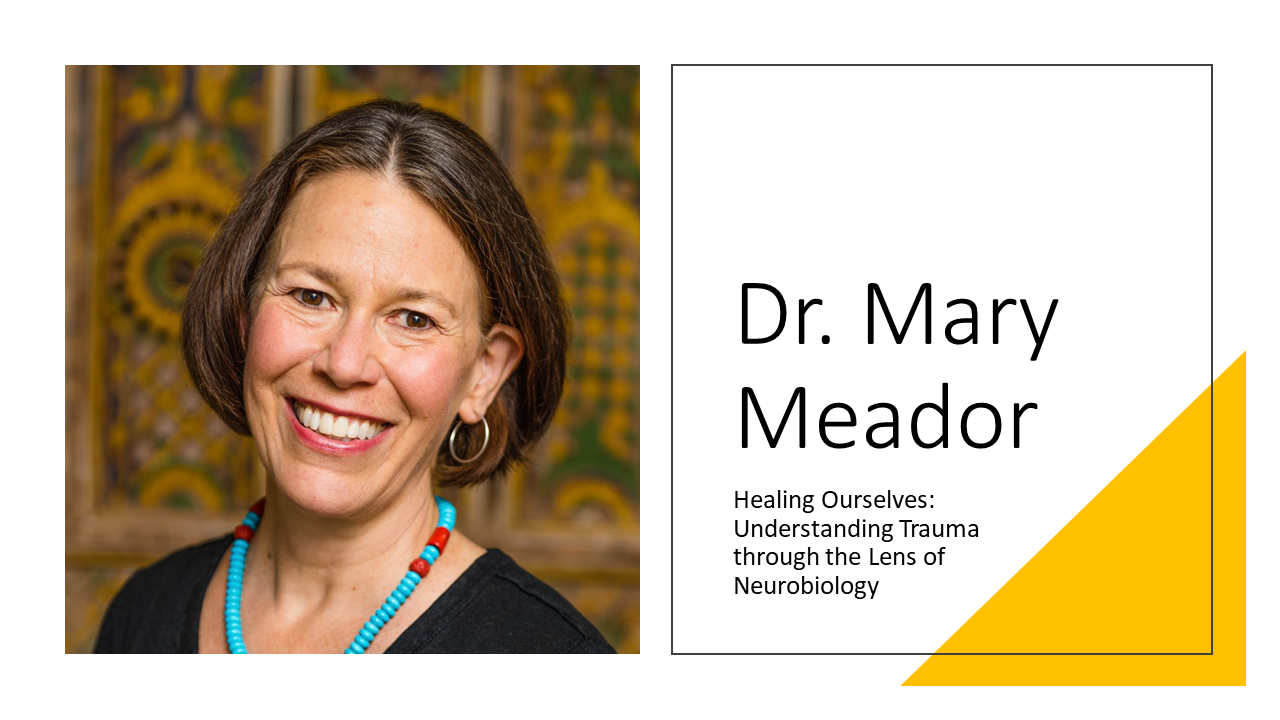
Understanding Your Brain: The Healing Power of Self Awareness
Saturday, May 1, at 9:15 am
Being human is a challenge for everyone. Living in a world with so much uncertainty, and overwhelming amounts of information available at the touch of a finger, feeds directly into feeling a lack of control, dread, and anxiety. These days, trauma, both near and far, is a very real part of our lives, and its effects can cause untoward suffering. Can we learn to overcome trauma and misfortune? Can we heal from these adverse events and actually grow and thrive? Are there ways we can prepare ourselves to navigate stressful situations? The answer to all of these questions is a resounding YES!
Part of the healing process is to see that life will always involve times of suffering. No matter how much therapy you do, or education you have, you will still be a human being when you wake up in the morning. You will still interact with other human beings who are different than you are and this can be challenging and confusing. Our task is not to have a perfect life, for that does not exist. Our task is to know ourselves better, because with this we can gain perspective and learn to have choice and change.
The human brain is more complex than anything scientists have ever known, yet these big brains of ours can be both a blessing and a curse. Fortunately, learning some basic concepts of how your brain and the rest of the nervous system works can be very useful. These ideas can help us to make sense of ourselves. The more we can be aware of the origins of our thoughts, feelings, attitudes, hopes, dreams, and moods, the better able we are to navigate our lives and all that we experience. With this increased awareness, we can actually rewire our brains, fostering resilience, and allowing us to move forward as the author of our own lives.
After this talk, you will
- Understand the evolution of brain development which results in the human brain containing both primitive (e.g., fight, flight, freeze response) and more advanced components (e.g., hopes and dreams for the future).
- Come to see the brain as a social organ built on experience, appreciating that it is largely our relationships that shape who we are.
- Know the fact that the vast majority of what motivates us is generated below the level of our awareness; we aren’t quite as rational and logical as we think we are.
- Recognize some of the inherent challenges in being in a relationship, whether as a spouse, a parent, a child, a friend, or a colleague.
- Have a better understanding of what it means to “rewire” your brain, to help you create a better you.
- Find out what it means to embrace better brain health, through exercise, meditation, healthy eating, adequate sleep, and positive social relationships.
- Begin to appreciate the effects of adverse experiences on the brain, such as trauma, and learn how to create resilience.
- Learn a little bit about the effects of digital technology and social media on the brain, and the connections to addiction.
- Be aware of the limitations of our understanding of how the brain works, recognizing that it is the most complex structure known to us today.
About Dr. Mary Meador
Mary Meador, MD is a Board Certified Family Physician with a practice limited to mental and behavioral health. After more than a decade of practicing primary care medicine, she chose to shift the focus of her practice in order to foster a deeper understanding of the indivisible connection between physical and mental health. Since 2002, she has worked with patients in private practice, as well as written and taught about the role that our relationships, the mind, and the brain all play in our well being.
Currently, she serves on the Board of Directors for GAINS (Global Association for Interpersonal Neurobiology) and for six years she taught the Science of IPNB with the Foundations of Interpersonal Neurobiology (IPNB) non-credit Certificate Program at Portland Community College – Institute for Health Professionals, as well as at Portland State University. She also serves on the Board of Directors for Andrus Childrens’ Center, a national leader in shaping policies and practices that prevent and overcome the effect of childhood adversity through trauma informed care.
Mary received her medical degree from Weill Cornell Medical College in New York City, and completed her residency in Family Medicine at Oregon Health Sciences University in Portland, Oregon. She also holds a Bachelor’s Degree in Psychology from the University of California, Davis.


